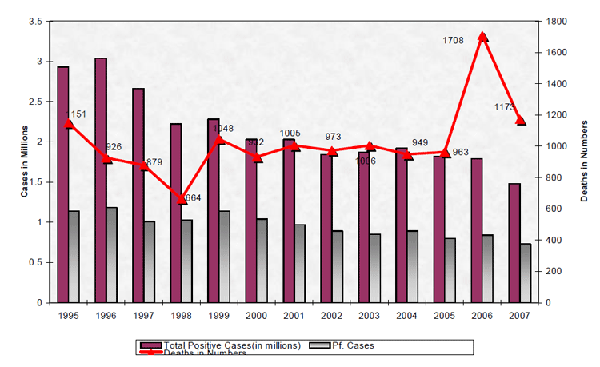
India had 9.6 million identified cases of malaria in 2017, 4th among the global incidence of 219 million cases of malaria.
On September 8th 2019, the Lancet Commission formed for discussing malaria eradication proposed the goal of eradicating malaria by 2050.
India is the only Asian country in the 10 countries with high number of malaria cases. All the other countries belong to the African continent.
India is also the only country where there is rapid prevalence of malaria in urban areas. In 2017, 71% cases of malaria in Tamil Nadu were identified from the capital city of Chennai.
The mosquito breed which acts as the carrier (vector) for malaria in India is suited for Indian urban environments according to the report.
Normally, urbanisation tends to reduce the transmission of malaria. But, due to India's high cases of urban malaria, the commission recommends nations to create policies which tackle urban malaria in its primary stages.
Why Is Malaria Eradication So Important?
In the 90's, almost 200 countries were endemic to malaria. It was a leading cause of death.
Malaria caused by the Plasmodium parasite is transmitted by the female Anopheles mosquito in poor sanitation areas.
Various mechanisms and programmes were launched to curb, control, and potentially eradicate the spread of the disease.
In 2017, 219 million cases of malaria were identified across 86 countries. The annual death rate decreased by 60%.
Yet, 55 countries between 2015-17 reported an increase in the cases of malaria.
The investment in controlling malaria has risen from 1.5 billion US dollars in 2000, to 4.3 billion in 2016. The commission, however, believes that an additional 2 billion dollars per annum should be further invested as malaria programs are normally believed to be underfunded.
What Are The Recommendations?
The Commission has listed a structure for achieving the mammoth task of eradication of malaria by 2050.
It believes that the research and development is already in place in the form of three different techniques.
Rapid diagnostic tests wherein a quick blood test helps in quickly identifying the presence of the malaria parasite in blood.
The second is artemisinin-based combination therapy (ACT) which is the first line of treatment for p.falciparum and is fast acting.
Finally, Long Lasting Insecticide-treated Nets (LLINs) which have been widely distributed in India for preventing mosquito bites.
Strengthening of governance and leadership along with focusing on regional elimination are a few of the primary recommendations of the Commission.
The Commission recommends the creation of an independent board for monitoring malaria eradication.
It also recommends combining the efforts of all the major donor agencies (Global Fund to Fight AIDS, Tuberculosis and Malaria and the US President's Malaria Initiative) and stakeholders (WHO and the RBM Partnership to End Malaria) for eradicating malaria.
Research should tackle drug resistance, insecticide resistance and outdoor transmission to accelerate the eradication process.
The commission also relies on technology by using information technology to alert front line health workers about prospective cases. Data hubs should be used for inter-sectoral collaboration.
The commission envisions the creation of a vaccine for malaria by 2035. Developing an efficient vaccine for malaria has been a long and arduous process due to the parasite's complex biology.
The private sector needs to be regulated and out of pocket spending needs to be reduced by increasing government spending on malaria.
The commission concludes by requesting the countries to create a road map to achieve all the goals as well as achieving Universal Health Coverage through eradicating malaria.